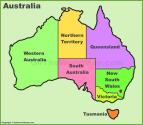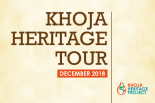Interested in studying in Australia? Here's your guide. click here to find out more.
Theorizing the development of Indic religious identities and cosmologies the conference explored the religious and social dynamics amongst mercantile communities of the western Indian Ocean

The inaugural Western Indian Ocean Studies workshop entitled 'Rahe Najat (The Path of Salvation): Religious and social dynamics amongst mercantile communities of the western Indian Ocean' was hosted by the department of religious studies from 12-13 November 2015 at the Florida International University in Miami. The workshop was organized by Iqbal Akhtar and Steven Vose to theorize the development of Indic religious identities and cosmologies in the western Indian Ocean littoral as these communities traversed land and the ocean for economic opportunities through changing political regimes.
The workshop was an international gathering of scholars from the United States, Canada, Denmark, Singapore, Chile, Pakistan, and India. The intent of the organizers was to assemble an interdisciplinary group of scholars to examine larger historical questions and (dis )continuities in conversation with the communities they study.
The workshop commenced with the screening of the documentary, The Khojas – A Joumey of Faith produced by Hasnain Walji. This helped to introduce the panel participants to each other and familiarize graduate students with the theme of the workshop. The film, which will later air on PBS, brought community perspectives into dialogue with academic research.
Frederick Asher presentation explored the Indian Ocean as a continuum with India as a fulcrum and posited theories based on archaeological evidence as to why Indic culture and religion thrived in the east but hardly made an impact on the societies of the East African littoral.
Shandip Saba followed trying to understand how the Vallabha Sampradaya became so influential in Gujarat theorizing the socio-economic change as a possible explanation for the Gujarati community's (of historical expansion and success.
Alia Paroo's, ground-breaking research examined the relationship of Aga Khan III to the British and the Ismaili community's positioning vis-it-vis the colonial government in Tanganyika as a political strategy that promoted communalism. Amal Sachedina presented a chapter of her forthcoming monograph on the question of Lawati Khoja in Oman through their shifting postcolonial identities as a strategy for political enfranchisement.
Cecil Pallensen's ethnographic research was located in Moshi Tanzania and is theorizing the 'two foot' approach of African Asians to maintaining transnational networks and identities between Tanzania and the United Kingdom.
Sarah Kazmi provided a comprehensive account of the Khoja community in Karachi through a postcolonial reading of their history. Khatija Khader examined the Hadrami and Sidi diasporas in India through ethnographic work on how postmodern identity discourses are racialized through globalization. Juan Bruce gave the last presentation, thinking graphically about the Khoja script as glyphs and the apparent discrepancy in narratives regarding the Husseini and Devraj presses in the late 19th century.

Liyakat Takim and Hasnain Walji concluded the workshop with a roundtable discussion on the tension within Khoja communities between the demands of Near Eastern Islamic authorities and communal desire for institutional independence in the preservation of identity.
The workshop is the first step in building an interdisciplinary group of scholars from the social sciences and humanities that have an interest Indic mercantile cultures and religious identities in the western Indian Ocean littoral. The conversation can perhaps lead to collaboration and also open academic discourses with the communities studied to promote academic access to and preservation of historical materials.
The Workshop was co-sponsored by the American Institute of Pakistan Studies, World Federation of Khoja Shia Ithnaasheri Muslim Communities, Steven J. Green School of International and Public Affairs, Department of Religious Studies, Center for the Humanities in an Urban Environment, the Jain Studies Program, Fauzia and MohsinJaffer Fund, and the Ahmadiyya Muslim community.
Related News
Related News
Our Second Khoja Heritage tour is back this December by popular demand! A holiday for all the family to enjoy! Book and secure your place by 31st Aug 2018. Read here to find out more.
Our Khoja Heritage tour is back! Register yourself to be part of an amazing discovery of our heritage! A holiday for all the family to enjoy! Frequently asked questions page.












